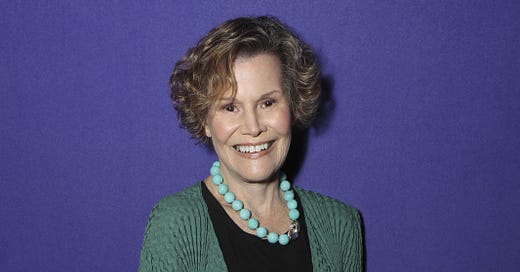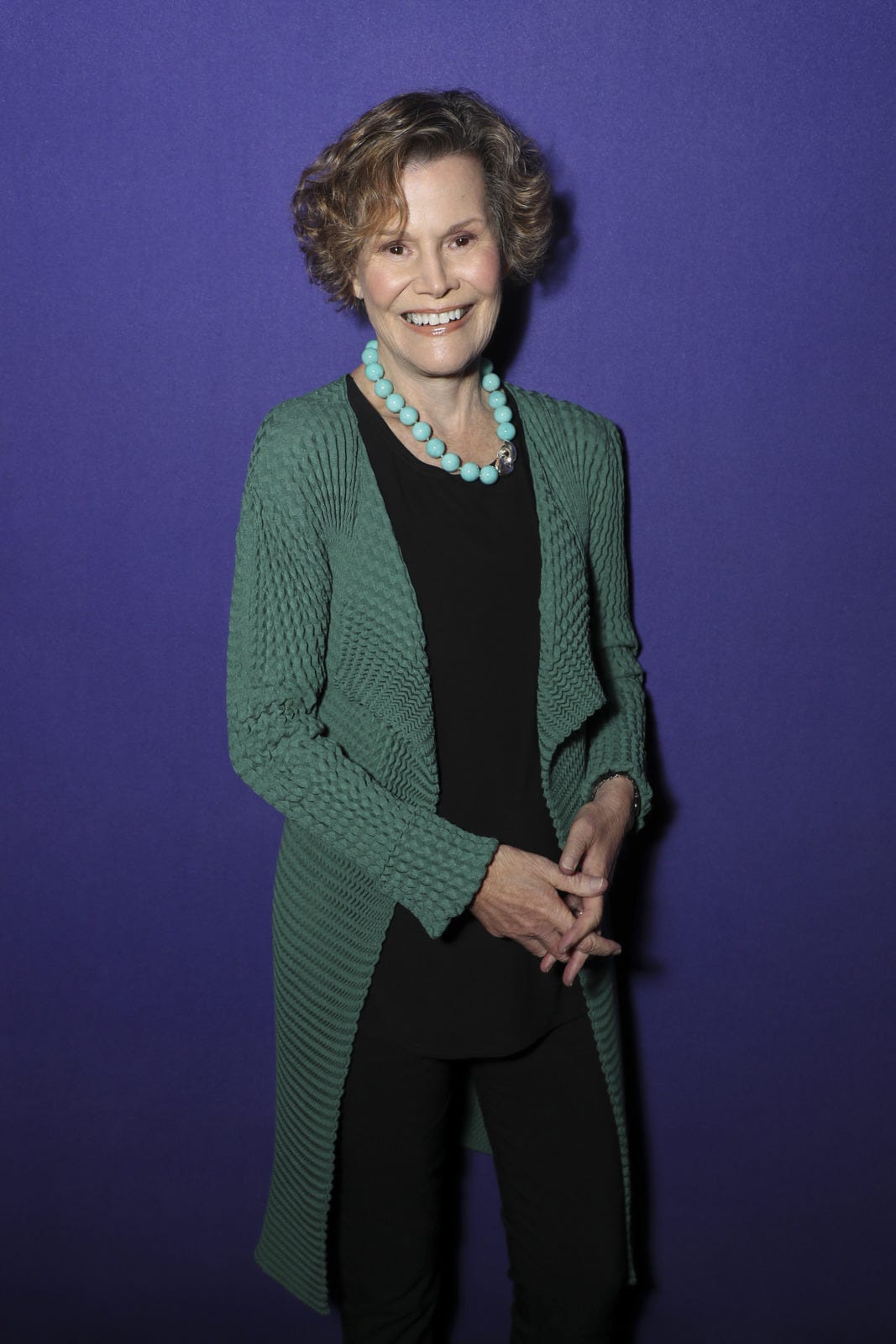Interview with Judy Blume
Judy Blume is an American writer. She is the author of 29 books, including: Are You There God? It's Me, Margaret (1970), Tales of a Fourth Grade Nothing (1972), and In the Unlikely Event (2015).
Judy Blume on Barbie…and Oppenheimer
[Interview begins with some audio difficulty]
Max Raskin: I guess I should make the joke: Are you there, Judy? It's me, Max.
Does anyone make that joke?
Judy Blume: You and everybody else.
MR: I have to ask: Did you see the Barbie movie?
JB: Oh yes, of course. I went with my grown daughter, and we wore pink. And we had a great time. She grew up with Barbies.
MR: Was it fun? What did you think about it?
JB: We both thought it was great fun. And I think that Greta Gerwig is just an amazing creative talent.
Ann Roth did the costumes for our Margaret movie, and she's very good friends with Greta Gerwig. She also did the costumes for Barbie.
There is a moment in the film when Barbie comes into the real world and sees an older woman sitting on a bench at a bus stop. And it is Ann Roth! Barbie says to her, "Oh, you're so beautiful." And Ann Roth, playing this woman, says, "Yes, I know."
MR: I also have to ask: Did you see Oppenheimer?
JB: Yes, I did.
MR: And what’d you think about that?
JB: I thought it was very, very, good. Great storytelling. I lived in Los Alamos for two years.
MR: What?
JB: Yes, I did.
MR: For what?
JB: Because I was briefly married to a physicist and he worked at the lab.
The marriage was a mistake, but that’s how I wound up in Los Alamos.
MR: What was it like?
JB: Let’s just say two years was enough. I had my kids with me, and they went to school there. That’s another story. But what was interesting to me about Oppenheimer were all of those names…and the history that I heard about constantly for two years.
We're away right now on vacation and our kids were here for a week. One of the nights we watched the Oppenheimer documentary, but Oppenheimer — the movie that's out now — it's just such an interesting way of seeing the story and getting to know the characters. A brilliant job.
MR: You lived through the 20th century and there were so many interesting characters and events — are you a history buff? Are there any figures you’re interested in?
JB: I find that the older I get, the more interested I am in history.
When I was a kid in school, history was not brought to life which is the way it should be taught. I can remember at NYU having a history professor who just had us memorize dates and events — that is no way to teach history or make history come alive. So much better to read a good book – fiction or non-fiction.
And of course, I've lived with George for almost 44 years and he's interested in everything. Living with someone who's interested in everything, you begin to absorb it all.
Reading List
MR: What's the most recent book you read cover to cover?
JB: Well, I should have a list because I'm a bookseller and I'm reading constantly.
I tend to read a lot of fiction because I need an answer for people who come into the store asking, "What's good? What have you read lately?"
Right now, I’m reading Richard Russo's new book. And I'm going to buy Ann Patchett's new book this afternoon. And I've got Ann Beattie's latest on my bedside table Also, I often read ahead so I know that in September Nathan Hill’s new novel, Wellness, is coming out. If you were a fan of his first novel, The Nix, and I was a big fan, you’ll want to read this one. You won’t be disappointed.
MR: What's the way you prefer to read?
JB: I still prefer to read a book, that is, a physical book. I like it…I like the smell of books, although they don't smell the same as they used to, and the feel of books and I like being able to flip through pages to find something I may have missed. I’m a fan of great cover art too.
MR: Do you write marginalia in your books?
JB: I do not write in my books, and I don't take notes. I read for pleasure and knowledge.
MR: You said you inherited that from your parents?
JB: My parents were big readers and there were a lot of books in my house growing up. I was very lucky that way. And no books were ever off-limits. That's such a bizarre idea to me, that you would tell people that you can't read a book.
I live in that state where the man who is supposedly a governor is king of book-banning and banning everything else, including certain history.
MR: Is there any way you would think about writing any of your books different today? Do you think about that at all?
JB: I'm easy on my books. I'm glad that I wrote them. I don't know how I did it. Sometimes I'll read one and think, "How did I know that? And where did that come from…?”
The only book that I've touched was Margaret. Right after it was published, menstrual equipment changed, and it went from belts and pins to sticky pads. I didn't do anything about it until I got a note from my British editor and she said, "It's stopping the story, and it shouldn't be stopping the story. The kind of equipment she’s using isn’t an essential part of Margaret's story.” I agreed she had a point so I changed from belts and pins to sticky pads. There's been a lot of discussion about that online.
I changed the electronics in the Fudge books to make sense as those books were written over a period of twenty years. I don’t think I’d do that today. I’d let the kids figure it out.
Hillary Clinton, Sesame Street, and J. K. Rowling
MR: Margaret is as much a coming-of-age story as an historical slice of life of a certain time. Reading you and about you, you seem like you grew up a Philip Roth-Jersey- Plot Against America girl. Would you say that's accurate?
JB: Some of it. I love that book. I think it's great. I'm a big Philip Roth fan. He was about five years older than me which means he would have known more about the War.
The biography about him written by Blake Bailey, that was removed from shelves — Roth worked with Bailey on it for many years, and it was maybe the best biography I'd ever read. It was wonderful. I would never remove it from my bookstore.
And, of course, I'm very interested in Philip Roth. He's from Newark, New Jersey. I'm from Elizabeth. Our mothers went to high school together. They were in the same high school class.
MR: Wow. Did you know him?
JB: I never met him. It's one of the regrets I have. Had I met him, maybe I wouldn't have liked him. But I would have liked to decide that for myself.
MR: Have you ever met any of your heroes?
JB: When we moved to Key West, there were a lot of writers who lived there — Ann Beattie was one of them. And I can remember being at a party once and we were playing charades, and the answer was one of her book titles. I was always very shy around her. I can't explain it.
I tried to tell her once, "Ann, with all the writers here, you are the one that I've read the most." Really, we're contemporaries. She's probably younger than I am. I'm sure she is younger than I am… most people are today.
But I said, "You are the one that I've read and that's really been important to me." And so it's harder for me to get beyond that.
I did meet Bill and Hillary Clinton at some big event.
MR: Did you become close with Hillary at all?
JB: Oh, no. Not close. But I once interviewed her for Sesame Street’s 25th anniversary. I'd never professionally interviewed anyone. And so George got me a little tape recorder, and off I went, like Brenda Starr. Do you know who Brenda Starr is?
MR: No.
JB: Oh, it was a comic strip when I was a kid. We all wanted to be Brenda Starr, girl reporter. And off I went to do that. And I told Hillary, I said, "I've never really interviewed anyone before."
She said, "Just turn that on and I'll talk."
MR: When you read about people you are interested in, do you find yourself interested in particular areas of their lives?
JB: I want to know everything! I am just interested in people. That's my whole life…people — making them up and what makes them tick. And how they think and why they do what they do. I like to have characters in my books say one thing, and then do something else.
MR: Do you ever say one thing and do something else?
JB: I have no idea, but I'm sure I have.
MR: Are you a political person? Do you keep up with the terminology of feminism and the latest political definitions?
JB: Yes, I'm a political person. Do I think about the terminology of feminism? I don't know that I think about the terminology. Lately I've had to think about TERFs — that’s trans-exclusionary radical feminists.
MR: Do you have any thoughts on J.K. Rowling’s views?
JB: I am not a TERF.
MR: You shaped so much of modern womanhood…or at least so many modern women have read and probably been shaped by your books.
JB: And she was too. Because I met her once and she said, "Oh, my sister and I loved your books. And we used to get into bed at night and we read Deenie.”
I only met her once very, very early in her career. And I don't know what's going on there…I'm not participating in any of the online controversies about that. But I'm supportive of people who want to be whatever they need to be.
MR: How would you classify yourself politically?
JB: I'm a liberal Democrat.
MR: Would you call yourself a progressive?
JB: I don't know what progressive is anymore. I read about all this and I still don't know. My husband says, “Progressive” is the frosting when people are embarrassed to say they're liberal — or afraid they can’t win elections. I'm not embarrassed to say I’m liberal.
For paid subscribers, read about Judy’s writing habits, view of God and the Grateful Dead.
Keep reading with a 7-day free trial
Subscribe to Interviews with Max Raskin to keep reading this post and get 7 days of free access to the full post archives.





